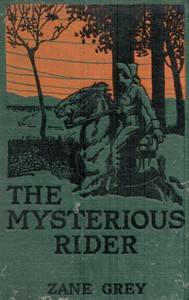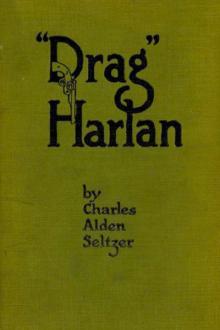The Day of the Beast, Zane Grey [read book txt] 📗

- Author: Zane Grey
Book online «The Day of the Beast, Zane Grey [read book txt] 📗». Author Zane Grey
"It's a lie," burst out Lorna. She was almost in tears.
Lane took her arm, making her start.
"Well, kids, you're having some time, aren't you," he said, cheerfully.
"Sure—are," gulped Harry.
Lorna repressed her grief, but not her sullen resentment.
Lane pretended not to notice anything unusual, and after a few casual remarks and queries he left them. Strolling from place to place, mingling with the gay groups, in the more secluded alcoves and recesses where couples appeared, oblivious to eyes, in the check room where a sign read: "check your corsets," out in the wide landing where the stairway came up, Lane passed, missing little that might have been seen or heard. He did not mind that two of the chaperones stared at him in supercilious curiosity, as if speculating on a possible faux pas of his at this dance. Both boys and girls he had met since his return to Middleville, and some he had known before, encountered him face to face, and cut him dead. He heard sarcastic remarks. He was an outsider, a "dead one," a "has been" and a "lemon." But Margaret was gracious to him, and Flossie Dickerson made no bones of her regard. Dorothy, he was relieved and glad to see, was not present.
Lane had no particular object in mind. He just wanted to rub elbows with this throng of young people. This was the joy of life he had imagined he had missed while in France. How much vain longing! He had missed nothing. He had boundlessly gained.
Out on this floor a railing ran round the curve of the stairway. Girls were sitting on it, smoking cigarettes, and kicking their slipper-shod feet. Their partners were lounging close. Lane passed by, and walking to a window in the shadow he stood there. Presently one of the boys threw away his cigarette and said: "Come on, Ironsides. I gotta dance. You're a rotten dancer, but I love you."
They ran back into the hall. The young fellow who was left indolently attempted to kiss his partner, who blew smoke in his face. Then at a louder blast of jazz they bounced away. The next moment a third couple appeared, probably from another door down the hall. They did not observe Lane. The girl was slim, dainty, gorgeously arrayed, and her keen, fair face bore traces of paint wet by perspiration. Her companion was Captain Vane Thesel, in citizen's garb, well-built, ruddy-faced, with tiny curled moustache.
"Hurry, kid," he said, breathlessly, as he pulled at her. "We'll run down and take a spin."
"Spiffy! But let's wait till after the next," she replied. "It's Harold's and I came with him."
"Tell him it was up to him to find you."
"But he might get wise to a car ride."
"He'd do the same. Come on," returned Thesel, who all the time was leading her down the stairway step by step.
They disappeared. From the open window Lane saw them go down the street and get into a car and ride away. He glanced at his watch, muttering. "This is a new stunt for dances. I just wonder." He watched, broodingly and sombrely. It was not his sister, but it might just as well have been. Two dances and a long intermission ended before Lane saw the big auto return. He watched the couple get out, and hurry up, to disappear at the entrance. Then Lane changed his position, and stood directly at the head of the stairway under the light. He had no interest in Captain Vane Thesel. He just wanted to get a close look at the girl.
Presently he heard steps, heavy and light, and a man's deep voice, a girl's low thrill of laughter. They turned the curve in the stairway and did not see Lane until they had mounted to the top.
With cool steady gaze Lane studied the girl. Her clear eyes met his. If there was anything unmistakable in Lane's look at her, it was not from any deception on his part. He tried to look into her soul. Her smile—a strange indolent little smile, remnant of excitement—faded from her face. She stared, and she put an instinctive hand up to her somewhat dishevelled hair. Then she passed on with her companion.
"Of all the nerve!" she exclaimed. "Who's that soldier boob?"
Lane could not catch the low reply. He lingered there a while longer, and then returned to the hall, much surprised to find it so dark he could scarcely distinguish the dancers. The lights had been lowered. If the dance had been violent and strange before this procedure, it was now a riot. In the semi-darkness the dancers cut loose. The paper strings had been loosened and had fallen down to become tangled with the flying feet and legs. Confetti swarmed like dark snowdrops in the hot air. Lane actually smelled the heat of bodies—a strangely stirring and yet noxious sensation. A rushing, murmuring, shrill sound—voices, laughter, cries, and the sliding of feet and brushing of gowns—filled the hall—ominous to Lane's over-sensitive faculties, swelling unnaturally, the expression of unrestrained physical abandon. Lane walked along the edge of this circling, wrestling melee, down to the corner where the orchestra held forth. They seemed actuated by the same frenzy which possessed the dancers. The piccolo player lay on his back on top of the piano, piping his shrill notes at the ceiling. And Lane made sure this player was drunk. On the moment then the jazz came to an end with a crash. The lights flashed up. The dancers clapped and stamped their pleasure.
Lane wound his way back to Blair.
"I've had enough, Blair," he said. "I'm all in. Let's go."
"Right-o," replied Blair, with evident relief. He reached a hand to Lane to raise himself, an action he rarely resorted to, and awkwardly got his crutch in place. They started out, with Lane accommodating his pace to his crippled comrade. Thus it happened that the two ran a gauntlet with watching young people on each side, out to the open part of the hall. There directly in front they encountered Captain Vane Thesel, with Helen Wrapp on his arm. Her red hair, her green eyes, and carmined lips, the white of her voluptuous neck and arms, united in a singular effect of allurement that Lane felt with scorn and melancholy.
Helen nodded to Blair and Lane, and evidently dragged at her escort's arm to hold him from passing on.
"Look who's here! Daren, old boy—and Blair," she called, and she held the officer back. The malice in her green glance did not escape Lane, as he bowed to her. She gloried in that situation. Captain Thesel had to face them.
It was Blair's hand that stiffened Lane. They halted, erect, like statues, with eyes that failed to see Thesel. He did not exist for them. With a flush of annoyance he spoke, and breaking from Helen, passed on. A sudden silence in the groups nearby gave evidence that the incident had been observed. Then whispers rose.





Comments (0)